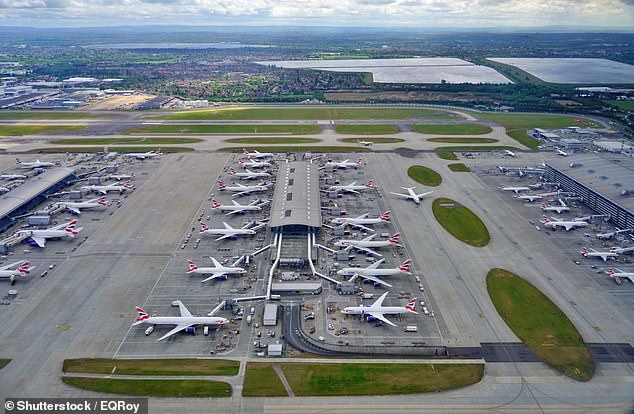Time to abolish YOUR tourist tax, Mr Sunak: Heathrow accuses PM of ‘closing the door’ on growth
Heathrow has accused Rishi Sunak of ‘closing the door’ on domestic growth when he introduced the ‘tourist tax’.
The Prime Minister scrapped a duty-free shopping scheme for international visitors in 2020, while he was Chancellor, despite protests from many leading companies.
Now he’s under pressure to announce a turnaround after companies said they were missing out.
Yesterday, Heathrow, Europe’s largest airport, warned that Britain’s reputation was at stake, accusing the Prime Minister of ‘turning away international shoppers’.
It is one of hundreds of companies urging Chancellor Jeremy Hunt and Sunak to scrap the tax at next month’s spring budget.
Under fire: Rishi Sunak scrapped a duty-free shopping scheme for international visitors in 2020 when he was chancellor, despite protests from businesses.
A Heathrow spokesman said yesterday: ‘While exports are booming, Britain has closed the door to domestic growth, turning away international shoppers through the tourist tax and damaging Britain’s reputation as a competitive country to spend money and do business. participation is affected.’
More than 400 prominent business leaders have called on the government to make a U-turn, as part of a campaign by The Mail.
In a win for The Mail, the government’s economic watchdog, the Office for Budget Responsibility, has opened an investigation into whether the reintroduction of tax-free shopping will cost more than it saves.
Heathrow’s comments came as stated: 6 million people traveled through the airport in January, an increase of 9.4 percent compared to early 2023.
But data shows that while tourists are returning to the country post-Covid, they are holding back on spending compared to other European countries.
Heathrow warned that global retailers are leaving the travel hub because of the tax and are instead setting up shop at Paris, Amsterdam and Milan airports.
In May, the airport said it had been forced to close 18 luxury designer stores, including Mulberry and Rolex, “in direct response” to the tax.
Daniel Platt, public affairs lead at Heathrow, added: ‘We still have shuttered stores, we have space that retailers don’t want to take up, which is not a situation we encountered in 2019.
“Britain’s competitiveness has been eroded since 2021. High-spending visitors have turned to European competitors and spent their money there.
Chinese passengers in particular have voted with their wallets, not necessarily with their feet, but they are spending less.’
Heathrow’s sharp words echo other industry warnings that Britain is losing its competitive edge over rival destinations such as Paris and Lisbon.

Subject: Terminal 5 at Heathrow. The airport is calling on the government to abolish the so-called ‘tourist tax’ in the spring budget next month.
Bosses claim the impact of the levy is being felt beyond luxury fashion stores Bond Street and Bicester Village, with transport companies, restaurants and museums also affected.
Ministers have tried to allay concerns from business leaders, saying tax-free shopping only benefits luxury brands and the wealthiest bargain-hunting tourists.
But a new analysis questioned the government’s previous calculations about the economic impact.
The Center for Economics and Business Research suggested last week that the tax is costing the wider economy more than £11 billion as wealthy tourists move to cities such as Paris, where tourists can shop tax-free.
A series of business leaders have spoken out against the levy, including Neil Clifford, the boss of luxury shoe brand Kurt Geiger, who described it as a “schoolboy mistake.”
Clifford told The Mail last week: ‘Those international visitors are just spending a lot more time in other cities.’
Fashion designer Sir Paul Smith said the campaign to abolish the tax was not intended to “help wealthy shoppers who come to buy cheap handbags” but to stimulate the wider economy.
But the Treasury claims restoring the perk would cost the exchequer £2 billion a year.
